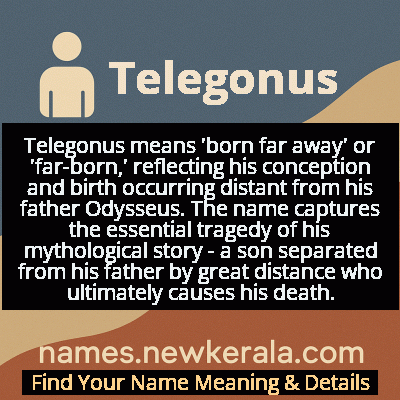Telegonus Name Meaning & Details
Origin, Popularity, Numerology Analysis & Name Meaning of Telegonus
Discover the origin, meaning, and cultural significance of the name TELEGONUS. Delve into its historical roots and explore the lasting impact it has had on communities and traditions.
Name
Telegonus
Gender
Male
Origin
Greek
Lucky Number
1
Meaning of the Name - Telegonus
Telegonus means 'born far away' or 'far-born,' reflecting his conception and birth occurring distant from his father Odysseus. The name captures the essential tragedy of his mythological story - a son separated from his father by great distance who ultimately causes his death.
Telegonus - Complete Numerology Analysis
Your Numerology Number
Based on Pythagorean Numerology System
Ruling Planet
Sun
Positive Nature
Leaders, ambitious, highly driven, self-reliant, innovative.
Negative Traits
Overly aggressive, domineering, impatient, selfish.
Lucky Colours
Red, orange, gold.
Lucky Days
Sunday.
Lucky Stones
Ruby, garnet.
Harmony Numbers
2, 3, 9.
Best Suited Professions
Entrepreneurs, managers, engineers.
What People Like About You
Courage, determination, leadership.
Famous People Named Telegonus
Telegonus of Greek Myth
Mythological Hero
Son of Odysseus and Circe who accidentally killed his father and later married Penelope
Telegonus (Literary Character)
Fictional Character
Central figure in the lost epic 'Telegony' who searches for and ultimately kills his unknown father
Telegonus (Operatic Character)
Opera Character
Featured in various Baroque operas based on Greek mythology, particularly those exploring father-son relationships
Name Variations & International Equivalents
Click on blue names to explore their detailed meanings. Gray names with will be available soon.
Cultural & Historical Significance
His story also bridges multiple mythological cycles, connecting the Odyssey's narrative with later generations and demonstrating how heroic legacies continue beyond their original protagonists. The marriage between Telegonus and Penelope after Odysseus's death creates a symbolic resolution to the epic cycle, merging different branches of Odysseus's lineage. This mythological resolution reflects Greek cultural values about family continuity and the transmission of heroic qualities across generations, even through complex and tragic circumstances.
Extended Personality Analysis
Individuals named Telegonus are often perceived as adventurous and determined, reflecting his mythological journey to find his father across unknown seas. They tend to possess a strong sense of purpose and resilience, capable of overcoming significant obstacles in pursuit of their goals. However, this determination can sometimes manifest as impulsiveness or a tendency to act without full consideration of consequences, mirroring the tragic outcome of his mythological namesake's quest.
There's often an underlying complexity to their character - a blend of curiosity about their origins or identity and a capacity for both great achievement and unintended destruction. Their personalities typically combine intellectual curiosity with physical courage, making them natural explorers and problem-solvers who aren't afraid to venture into unknown territory. The mythological Telegonus's story suggests individuals with this name might struggle with understanding their place in complex family dynamics or legacy systems, often finding themselves caught between different worlds or expectations without clear guidance.
Modern Usage & Popularity
In contemporary times, Telegonus remains an exceptionally rare given name, primarily used by classical scholars, mythology enthusiasts, or parents seeking a distinctive name with deep mythological roots. Its usage is almost exclusively confined to Greece and academic circles, with no recorded popularity in modern name databases. The name's association with patricide, even if accidental, makes it challenging for widespread adoption. However, it occasionally appears in literary works, video games, and other media that draw from Greek mythology. The name's complexity and tragic backstory limit its mainstream appeal, though it maintains a niche presence among those who appreciate its classical heritage and the profound themes it represents. In recent years, there has been minor renewed interest in mythological names, but Telegonus remains far less popular than other Greek mythological names like Odysseus, Achilles, or Perseus.
Symbolic & Spiritual Meanings
Telegonus symbolizes the unintended consequences of actions and the inescapable nature of destiny in Greek thought. His name represents the search for identity and the complex relationship between fathers and sons across generations. The mythological spear made from a stingray barb that he used to kill Odysseus symbolizes how even the most mundane or distant elements can become instruments of fate. Telegonus embodies the concept of 'the return of the repressed' - how past actions and relationships inevitably resurface to shape present realities. His story serves as a metaphor for technological advancement (his magical spear) overwhelming traditional heroism, and the inevitable transition of power between generations, often with tragic but necessary consequences for societal evolution. The name also represents the idea that our origins, no matter how distant or obscure, ultimately define our destinies in ways we cannot always anticipate or control.

